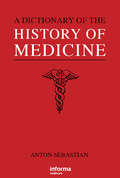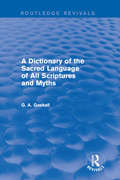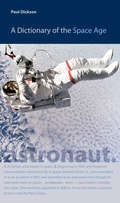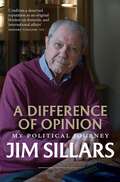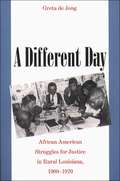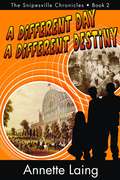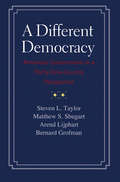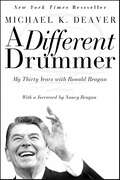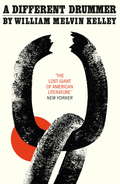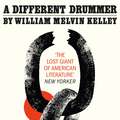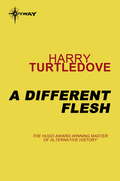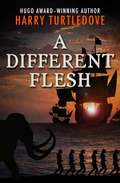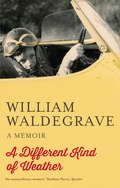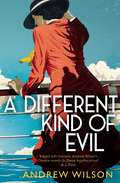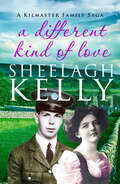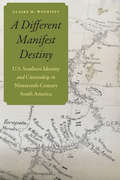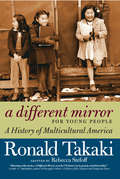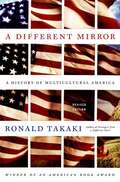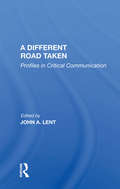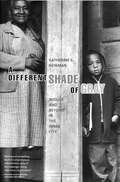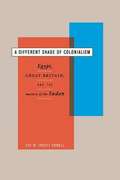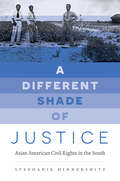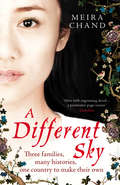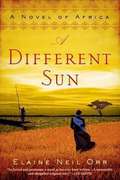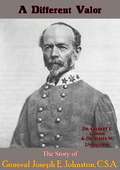- Table View
- List View
A Dictionary of the History of Medicine
by Anton SebastianThis is a unique, extensively illustrated dictionary of terms, people, events, and dates spanning the entire history of medicine. It is a monumental work of scholarship totaling some 700 double-column pages with a large number of rare and exceptional illustrations from many original sources painstakingly compiled over years of far-searching inquiry involving more than 5,000 books and hundreds of journals. It is a major resource of hard-to-find information about notable medical figures, instruments, conditions, procedures, and dates and a storehouse of captivating anecdotes and background material. The book contains a wealth of material for concise historical introductions to a broad range of subjects and is the sine qua non authority on both well and little known facts of medical history. With this single volume-an unprecedented tour de force representing more than 7,000 hours of exhaustive research-clinicians and researchers from all fields of medicine can quickly and easily find authoritative, detailed definitions and descriptions, with dates, of medical terms and of the people and events contributing to the development of medicine from earliest times to the present day. The entries range widely from such as abacterial pyuria to zygote, including Latin and Greek origins of terms, compact biographies with dates, eponymic information of all kinds, and rarely seen drawings and photographs of antique medical instruments and little-known conditions.
A Dictionary of the Sacred Language of All Scriptures and Myths (Routledge Revivals)
by G GaskellG. A. Gaskell’s Dictionary of the Sacred Language of All Scriptures and Myths, first published in 1923, examines several different aspects of religion, including examples from Ancient Egyptian religion and mythology to modern-day Christianity, providing explanations of gods, events, and symbols in alphabetical order. This is a perfect reference book for students of theology or the history of religion.
A Dictionary of the Space Age (New Series in NASA History)
by Paul Dickson2009 Outstanding Academic Title, ChoiceThe launch of Sputnik 1 in 1957 ushered in an exciting era of scientific and technological advancement. As television news anchors, radio hosts, and journalists reported the happenings of the American and the Soviet space programs to millions of captivated citizens, words that belonged to the worlds of science, aviation, and science fiction suddenly became part of the colloquial language. What’s more, NASA used a litany of acronyms in much of its official correspondence in an effort to transmit as much information in as little time as possible. To translate this peculiar vocabulary, Paul Dickson has compiled the curious lingo and mystifying acronyms of NASA in an accessible dictionary of the names, words, and phrases of the Space Age.Aviators, fighter pilots, and test pilots coined the phrases "spam in a can" (how astronauts felt prelaunch as they sat in a tiny capsule atop a rocket booster); "tickety-boo" (things are fine), and "the Eagle has landed" (Neil Armstrong’s famous quote when Apollo 11 landed on the Moon).This dictionary captures a broader foundation for language of the Space Age based on the historic principles employed by the Oxford English Dictionary and Webster’s New Third International Dictionary. Word histories for major terms are detailed in a conversational tone, and technical terms are deciphered for the interested student and lay reader. This is a must-own reference for space history buffs.
A Difference of Opinion: My Political Journey
by Jim SillarsJim Sillars, among the last of his generation’s working-class politicians, has had a prominent role in Scottish public life for more than six decades, during which he moved from being a Unionist Labour MP to becoming deputy leader of the SNP and now a sharp critic of the party’s cult of personality. In this candid memoir, he records a controversial political life from local councillor to Westminster MP, during which he had dealings with many prominent politicians of the day. But he also reflects on what moulded him in his early years, the added influences of his service in the Royal Navy, his time in Hong Kong, his trade union activity and his non-political business engagements in the Middle East and Asia. Bringing the book up to date to address contemporary issues, he offers views on Brexit, Russia, the Middle East, climate change, the Alex Salmond trial and the consequences of the 2021 Holyrood election. He and Margo MacDonald, to whom he was married for thirty-three years, were a formidable political partnership until her death in 2014. He pays a heartfelt tribute to her in this book.
A Different Day
by Greta De JongExamining African Americans' struggles for freedom and justice in rural Louisiana during the Jim Crow and civil rights eras, Greta de Jong illuminates the connections between the informal strategies of resistance that black people pursued in the early twentieth century and the mass protests that emerged in the 1950s and 1960s. Using evidence drawn from oral histories and a wide range of other sources, she demonstrates that rural African Americans were politically aware and active long before civil rights organizers arrived in the region in the 1960s to encourage voter registration and demonstrations against segregation. De Jong explores the numerous, often-subtle methods African Americans used to resist oppression within the confines of the Jim Crow system. Such everyday forms of resistance included developing strategies for educating black children, creating strong community institutions, and fighting back against white violence. In the wake of the economic changes that swept the South during and after World War II, these activities became more open and organized, culminating in voter registration drives and other protests conducted in cooperation with civil rights workers. Deeply researched and accessibly written, A Different Day spotlights the ordinary heroes of the freedom struggle and offers a new perspective on black activism throughout the twentieth century.
A Different Day, A Different Destiny (The Snipesville Chronicles #2)
by Annette LaingWhen you wake up in the year 1851 on a Scottish hillside...Or in an English coal mine...Or on a plantation in the Deep South, you know you re in for a bad day. Nothing for Hannah and Alex Dias has been normal since they moved from San Francisco to the little town of Snipesville, Georgia. Bad enough that they and their dorky new friend Brandon became reluctant time-travellers to World War Two England. Oh, sure, they made it home safely (just) but now things are about to get worse. Much worse. From the cotton fields of the Slave South to London's glittering Crystal Palace, the kids chase a lost piece of twenty-first century technology in the mid-nineteenth century. But finding it is only the beginning of what they must do to heal Time.
A Different Democracy
by Bernard Grofman Arend Lijphart Steven L. Taylor Matthew Soberg ShugartFour distinguished scholars in political science analyze American democracy from a comparative point of view, exploring how the U.S. political system differs from that of thirty other democracies and what those differences ultimately mean for democratic performance. This essential text approaches the following institutions from a political engineering point of view: constitutions, electoral systems, and political parties, as well as legislative, executive, and judicial power. The text looks at democracies from around the world over a two-decade time frame. The result is not only a fresh view of the much-discussed theme of American exceptionalism but also an innovative approach to comparative politics that treats the United States as but one case among many. An ideal textbook for both American and comparative politics courses.
A Different Drummer: My Thirty Years with Ronald Reagan
by Michael K. DeaverThe New York Times bestselling memoir of Ronald Reagan by his longtime aide and friend"These are memories of a friend and they span over the 35 years that I have known and loved Ronald and Nancy Reagan. Primarily anecdotal, there will be no footnotes, simply my best efforts to reconstruct these years and what they have meant to me."--Michael DeaverRONALD REAGAN AND ME will be comprised of six parts:The Early Years: Deaver and his first meeting with Reagan during his campaign for governor of California in 1966. His first impressions of Reagan's his management style, media savvy and incredible ability to communicate.Reagan: The Man: A look at the traits that make the man: perfectionist, competitor, unwavering discipline, and a deep sense of purpose and destiny.Sincerely, Ronald Reagan: Never-before-published excerpts from letters Reagan wrote to people of various backgrounds.The Campaigner: On the stump during the presidential campaigns.Mr. President: Reagan in action in the Oval Office. How he changed after he was shot, and his battles with Congress and Communism.The Long Goodbye: With Nancy's cooperation, a look at the Reagans' struggle with Alzheimers and the impact it has had on their marriage and the family.
A Different Drummer: the extraordinary rediscovered classic
by William Melvin Kelley'More than lives up to the hype' Observer'Set to become a publishing sensation' Kirsty Lang, BBC Front Row'An astounding achievement' Sunday Times'The lost giant of American literature' New YorkerJune, 1957. One afternoon, in the backwater town of Sutton, a young black farmer by the name of Tucker Caliban matter-of-factly throws salt on his field, shoots his horse and livestock, sets fire to his house and departs the southern state. And thereafter, the entire African-American population leave with him.The reaction that follows is told across a dozen chapters, each from the perspective of a different white townsperson. These are boys, girls, men and women; either liberal or conservative, bigoted or sympathetic - yet all of whom are grappling with this spontaneous, collective rejection of subordination.In 1962, aged just 24, William Melvin Kelley's debut novel A Different Drummer earned him critical comparisons to James Baldwin and William Faulkner. Fifty-five years later, author and journalist Kathryn Schulz happened upon the novel serendipitously and was inspired to write the New Yorker article 'The Lost Giant of American Literature', included as a foreword to this edition.
A Different Drummer: the extraordinary rediscovered classic
by William Melvin KelleyIn 1962, aged just 24, William Melvin Kelley's debut novel A Different Drummer earned him critical comparisons to James Baldwin and William Faulkner. Fifty-five years later, author and journalist Kathryn Schulz happened upon the novel serendipitously and was inspired to write the New Yorker article 'The Lost Giant of American Literature', included as a foreword to this edition.June, 1957. One afternoon, in the backwater town of Sutton, a young black farmer by the name of Tucker Caliban matter-of-factly throws salt on his field, shoots his horse and livestock, sets fire to his house and departs the southern state. And thereafter, the entire African-American population leave with him.The reaction that follows is told across a dozen chapters, each from the perspective of a different white townsperson. These are boys, girls, men and women; either liberal or conservative, bigoted or sympathetic - yet all of whom are grappling with this spontaneous, collective rejection of subordination.A lost masterpiece republished for 2018, A Different Drummer is for readers who have been waiting for the next rediscovered classic.(P)2018 Quercus Editions Limited
A Different Flesh
by Harry TurtledoveWhat if when Columbus came to the New World he found, not Indians, but primitive apelike men who were soon dubbed "sims"?These immediate ancestors of modern man were less effective hunters, allowing prehistoric creatures such as mammoths and saber-toothed tigers to survive. Unable to learn human speech or conceptualize at a human level, sims could, however, be trained to do reliable work... as slaves.
A Different Flesh
by Harry TurtledoveThis novel by the New York Times–bestselling &“master of alternate history&” explores an America reshaped by a twist in prehistoric evolution (Publishers Weekly). What if mankind&’s &“missing link,&” the apelike Homo erectus, had survived to dominate a North American continent where woolly mammoths and saber-toothed tigers still prowled, while the more advanced Homo sapiens built their civilizations elsewhere? Now imagine that the Europeans arriving in the New World had chanced on these primitive creatures and seized the opportunity to establish a hierarchy in which the sapiens were masters and the &“sims&” were their slaves. This is the premise that drives the incomparable Harry Turtledove&’s A Different Flesh. The acclaimed Hugo Award winner creates an alternate America that spans three hundred years of invented history. From the Jamestown colonists&’ desperate hunt for a human infant kidnapped by a local sim tribe, to a late-eighteenth-century contest between a newfangled steam-engine train and the popular hairy-elephant-pulled model, to the sim-rights activists&’ daring 1988 rescue of an unfortunate biped named Matt who&’s being used for animal experimentation, Turtledove turns our world inside out in a remarkable science fiction masterwork that explores what it truly means to be human.
A Different Kind Of Weather: A Memoir
by William Waldegrave'Why did you go into politics in the first place?'A question that former Cabinet minister has found himself asked, and indeed asking himself, over the years, Lord Waldegrave's is a life lived through politics.The youngest of seven children, and the son of an earl, Waldegrave's quintessentially English upbringing would go on to shape the course of his life, instilling in him a sense of independence and self-discipline needed to steel one for a successful career in government. Formative years spent at Eton, Oxford and Harvard fortified his resolve to enter the political establishment, and by the early seventies he finally achieved his greatest ambition.As an fearless young Conservative politician in the seventies and eighties, one who witnessed the fall of Heath and the triumph and eventual decline of Thatcher, Waldegrave was firmly at the heart of one of the most exciting and tumultuous periods of modern British history. However just as his star was in the ascent, Waldegrave became embroiled in a scandal which tarnished his reputation, but could not dampen his voracious enthusiasm for the political game. An unembroidered account of the narcotic effect of politics from one of the most fiercely intellectual governmental figures of the modern age, A Different Kind of Weather is a beautifully weighted memoir of political success and failure, and the passing of an era.A Spectator Book of the Year - 'refreshingly and engagingly candid' (Jane Ridley)
A Different Kind of Evil: A Novel
by Andrew Wilson'The queen of crime is the central character in this audacious mystery, which reinvents the story of her mysterious disappearance with thrilling results' GUARDIAN In January 1927 – and still recovering from the harrowing circumstances surrounding her disappearance a month earlier – Agatha Christie sets sail on an ocean liner bound for the Canary Islands. She has been sent there by the British Secret Intelligence Service to investigate the death of one of its agents, whose partly mummified body has been found in a cave. Early one morning, on the passage to Tenerife, Agatha witnesses a woman throw herself from the ship into the sea. At first, nobody connects the murder of the young man on Tenerife with the suicide of a mentally unstable heiress. Yet, soon after she checks into the glamorous Taoro Hotel situated in the lush Orotava Valley, Agatha uncovers a series of dark secrets. The famous writer has to use her novelist’s talent for plotting to outwit an enemy who possesses a very different kind of evil. What readers are saying about Andrew Wilson's books: 'Wilson not only knows his subject but he deftly moves the tale away from mere literary ventriloquism and into darker territory. Great fun, too’ Observer 'A crafty whodunit worthy of the queen of mystery herself . . . . Wilson does a superior job of balancing surprising plot developments with a sensitive portrayal of his lead’s inner life' Publishers Weekly ‘The initial premise of the story is pure genius, and when the reader realises by the end of chapter one whose head they are inside, goose bumps are guaranteed to occur’ Greg, Goodreads, 4 stars ‘A darkly twisting tale of murder and manipulation’ Erin Britton, NetGalley, 4 stars
A Different Kind of Love (The Kilmaster Family Sagas)
by Sheelagh KellyWhen a veteran of the Great War returns to England, he and his daughters faces a terrible new struggle in this historical family saga. World War I is at its height and Regimental Sergeant Major Probyn Kilmaster is in France, training raw recruits to send to the trenches. Meanwhile, his wife Grace contends with the hardships of raising their children alone in a Yorkshire pit village. But when Probyn finally returns home safely, the Kilmasters are struck by tragedy. Probyn attempts to keep the family together by giving his daughters a stepmother. But for Augusta, Maddie, Mims—and especially the sensitive Beata—this well-meaning gesture is more than they can bear. Now each must find her own way to escape the cruelty and oppression that has unwittingly been visited upon them.
A Different Manifest Destiny: U.S. Southern Identity and Citizenship in Nineteenth-Century South America
by Claire M. WolnistyThe South possessed an extensive history of looking outward, specifically southward, to solve internal tensions over slavery and economic competition in the 1820s through the 1860s. Nineteenth-century southerners invested in their futures, and in their identity as southerners, when they expanded their economic and proslavery connections to Latin America, seeking to establish a vast empire rooted in slavery that stretched southward to Brazil and westward to the Pacific Ocean. For these modern expansionists, failure to cement those connections meant nothing less than the death of the South. In A Different Manifest Destiny Claire M. Wolnisty explores how elite white U.S. southerners positioned themselves as modern individuals engaged in struggles for transnational power from the antebellum to the Civil War era. By focusing on three groups of people not often studied together—filibusters, commercial expansionists, and postwar southern emigrants—Wolnisty complicates traditional narratives about Civil War–era southern identities and the development of Manifest Destiny. She traces the ways southerners capitalized on Latin American connections to promote visions of modernity compatible with slave labor and explores how southern–Latin American networks spanned the years of the Civil War.
A Different Mirror for Young People: A History of Multicultural America (For Young People Series)
by Rebecca Stefoff Ronald TakakiA longtime professor of Ethnic Studies at the University of California at Berkeley, Ronald Takaki was recognized as one of the foremost scholars of American ethnic history and diversity. When the first edition of A Different Mirror was published in 1993, Publishers Weekly called it "a brilliant revisionist history of America that is likely to become a classic of multicultural studies" and named it one of the ten best books of the year. Now Rebecca Stefoff, who adapted Howard Zinn's best-selling A People's History of the United States for younger readers, turns the updated 2008 edition of Takaki's multicultural masterwork into A Different Mirror for Young People. Drawing on Takaki's vast array of primary sources, and staying true to his own words whenever possible, A Different Mirror for Young People brings ethnic history alive through the words of people, including teenagers, who recorded their experiences in letters, diaries, and poems. Like Zinn's A People's History, Takaki's A Different Mirror offers a rich and rewarding "people's view" perspective on the American story.
A Different Mirror: A History of Multicultural America
by Ronald TakakiTakaki (emeritus, ethnic studies, U. of California-Berkeley) takes the perspective of ethnic, racial, and national minorities to recount the history of the US since the founding of the first English colony in 1607. The first edition won an American Book Award in 1993. This second incorporates new passages on Franklin Roosevelt's response to the Holocaust, the influx of Southeast Asian immigrants after the Vietnam War, and people pushed northward by poverty in Mexico.
A Different Road Taken: Profiles In Critical Communication
by John A LentDallas Smythe, George Gerbner, Herbert Schiller, James Halloran, Kaarle Nordenstreng- these five seminal figures form the backbone of current scholarship in critical communication. From policy research to television demographics and from economic globalization to cultural imperialism, their insights and discoveries have given both scholars and the
A Different Shade Of Gray: Midlife And Beyond In The Inner City
by Katherine S. NewmanCombining details about specific people with analysis of the trends that have shaped their lives, this book exposes the aging urban underclass. It focuses on the lives of the elderly African Americans and Latinos in pockets of New York City, where wages are low, and crime is often high.
A Different Shade of Colonialism: Egypt, Great Britain, and the Mastery of the Sudan
by Eve M. Troutt PowellEve M. Troutt Powell challenges many accepted tenets of the binary relationship between European empires and non-European colonies by examining the triangle of colonialism marked by Great Britain, Egypt, and the Sudan.
A Different Shade of Justice: Asian American Civil Rights in the South (Justice, Power, and Politics)
by Stephanie HinnershitzIn the Jim Crow South, Chinese, Filipino, Japanese, and, later, Vietnamese and Indian Americans faced obstacles similar to those experienced by African Americans in their fight for civil and human rights. Although they were not black, Asian Americans generally were not considered white and thus were subject to school segregation, antimiscegenation laws, and discriminatory business practices. As Asian Americans attempted to establish themselves in the South, they found that institutionalized racism thwarted their efforts time and again. However, this book tells the story of their resistance and documents how Asian American political actors and civil rights activists challenged existing definitions of rights and justice in the South.From the formation of Chinese and Japanese communities in the early twentieth century through Indian hotel owners' battles against business discrimination in the 1980s and '90s, Stephanie Hinnershitz shows how Asian Americans organized carefully constructed legal battles that often traveled to the state and federal supreme courts. Drawing from legislative and legal records as well as oral histories, memoirs, and newspapers, Hinnershitz describes a movement that ran alongside and at times intersected with the African American fight for justice, and she restores Asian Americans to the fraught legacy of civil rights in the South.
A Different Sky
by Meira ChandSingapore - a trading post where different lives jostle and mix. It is 1927, and three young people are starting to question whether this inbetween island can ever truly be their home. Mei Lan comes from a famous Chinese dynasty but yearns to free herself from its stifling traditions; ten-year-old Howard seethes at the indignities heaped on his fellow Eurasians by the colonial British; Raj, fresh off the boat from India, wants only to work hard and become a successful businessman. As the years pass, and the Second World War sweeps through the east, with the Japanese occupying Singapore, the three are thrown together in unexpected ways, and tested to breaking point.Richly evocative, A Different Sky paints a scintillating panorama of thirty tumultuous years in Singapore's history through the passions and struggles of characters the reader will find it hard to forget.
A Different Sun
by Elaine Neil OrrA "lush, evocative, breathtaking"* debut novel from Elaine Neil Orr, "reminiscent of Barbara Kingsolver's magnum opus, The Poisonwood Bible, with elements of Joseph Conrad and Louise Erdrich."* Also I heard the voice of the Lord, saying, Whom shall I send, and who will go for us? Then said I, Here am I; send me. When Emma Davis reads the words of Isaiah 6:8 in her room at a Georgia women's college, she understands her true calling: to become a missionary. It is a leap of faith that sweeps her away to Africa in an odyssey of personal discovery, tremendous hardship, and profound transformation. For the earnest, headstrong daughter of a prosperous slave owner, living among the Yoruba people is utterly unlike Emma's sheltered childhood--as is her new husband, Henry Bowman. Twenty years her senior, the mercurial Henry is the object of Emma's mad first love, intensifying the sensations of all they see and share together. Each day brings new tragedy and heartbreak, and each day, Emma somehow finds the hope, passion, and strength of will to press onward. Through it all, Henry's first gift to Emma, a simple writing box--with its red leather-bound diary and space for a few cherished keepsakes--becomes her closest confidant, Emma's last connection to a life that seems, in this strange new world, like a passing memory. A tale of social and spiritual awakening; a dispatch from a difficult era at home and abroad; and a meditation on faith, freedom, and desire, A Different Sun is a captivating fiction debut. *Library Journal (starred review)
A Different Valor: The Story of General Joseph E. Johnston, C.S.A.
by Dr James W. Livingood Dr Gilbert E. GovanOriginally published in 1956, this book is a full account of General Joseph E. Johnston (1807-1891), a career U.S. Army officer who served with distinction in the Mexican-American War and Seminole Wars, and was one of the most senior general officers--second only to General Robert E. Lee--in the Confederate States Army during the American Civil War.Although heartily disliked by Confederate president Jefferson Davis, who often criticized him for a lack of aggressiveness and took every opportunity to sully his opponent's name, General Johnston's patriotic devotion to the Southern cause prevented him from resigning, and he rose to gain enormous respect from his major opponents for his actions during a number of campaigns--including General Ulysses S. Grant and Union Maj. Gen. William T. Sherman, who became close friends with Johnston in subsequent years.A leading text for Civil War enthusiasts.Illustrated with 6 detailed maps.
